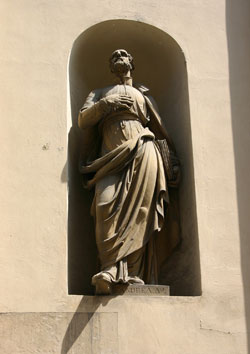
Feastday: November 10
Patron: of Naples, Sicily; invoked against sudden death
Birth: 1521
Death: 1608
Theologian, founder, and friend of St. Charles Borromeo. Born in 1521 at Castonuevo, Sicily, and baptized Lancellato, he took the name of Andrew as a Theatine monk. A devoted young man who was also very handsome, Andrew studied in Venice and in Naples, being ordained and receiving a Doctorate of Laws at the age of twenty-six. He served in the ecclesiastical court in Naples until he realized that he was capable of lying in order to win a legal argument. His remorse led to his retirement from the court, and he was commissioned by the archbishop of Naples to reform a lax convent in the city. He was attacked by a group of men who opposed this reformation and was taken to the Theatine monastery to recuperate in safety. Andrew entered the Order of Theatines, which had been founded just a few years before by St. Cajetan. After completing his novitiate, Andrew visited the shrines of Rome, returning to Naples to become the director of novices for the Theatines. He also founded several new Theatine monasteries, serving as superior in some. St. Charles Borromeo learned to depend on Andrew's wisdom in affairs of the Church. He also wrote treatises and preached. Andrew died on November 10, 1608. He is a patron of Sicily and is invoked against sudden death. He is buried in Naples.
We ask you, humbly: don't scroll away.
Hi readers, it seems you use Catholic Online a lot; that's great! It's a little awkward to ask, but we need your help. If you have already donated, we sincerely thank you. We're not salespeople, but we depend on donations averaging $14.76 and fewer than 1% of readers give. If you donate just $5.00, the price of your coffee, Catholic Online School could keep thriving. Thank you.Help Now >
 Body of Blessed Andrew Avellino in San Paolo Maggiore (Naples).
Body of Blessed Andrew Avellino in San Paolo Maggiore (Naples).
Andrew (Andrea) Avellino (1521 – 10 November 1608) was an Italian Theatine priest. He is venerated as patron saint of Naples and Sicily and invoked especially against a sudden death. He led a life busy in preaching, hearing confessions, and visiting the sick, and writing.
Life
Born at Castronuovo (today Castronuovo di Sant'Andrea), a small town in the province of Potenza, in Basilicata, his baptismal name was Lancelotto, which he changed to Andrew when he entered the Order of Theatines. After receiving his elementary training in the school at Castronuovo, he was sent to Venice to pursue a course in the humanities and in philosophy. Being a handsome youth, his chastity was often exposed to danger from female admirers, and to escape their importuning he took ecclesiastical tonsure.
He went to Naples to study canon and civil law, obtained the degree of Doctor of Laws and was ordained priest at the age of twenty-six. For some time he held the office of lawyer at the ecclesiastical court of Naples.
The archbishop of Naples now commissioned him to reform a convent at Naples, which by the laxity of its discipline had become a source of great scandal. By his own example and his untiring zeal he restored the religious discipline of the convent but not without many and great difficulties. Certain wicked men who were accustomed to have clandestine meetings with the nuns became exasperated at the saint's interference, and one night he was assaulted and severely wounded. He was brought to the monastery of the Theatines to recuperate. Here, however, he resolved to devote himself entirely to God and he entered the Order of Theatines, which had only recently been founded by Gaetano dei Conti di Thiene. In 1556, on the vigil of the Assumption he was invested, being then thirty-five years of age. He took the name of Andrew in honor of the apostle.
After completing his novitiate, he obtained permission to visit the tombs of the Apostles and the Martyrs at Rome, and, upon his return, was made master of novices. After holding this office for ten years, he was elected superior. His zeal for strict religious discipline and for the purity of the clergy, as well as his deep humility and sincere piety, induced the General of his Order to entrust him with the foundation of two new Theatine houses, one at Milan and the other at Piacenza. By his efforts, many more Theatine houses rose up in various dioceses of Italy. As superior of some of these new foundations, he was so successful in converting sinners and heretics by his prudence in the direction of souls and by his eloquent preaching that numerous disciples thronged around him, eager to be under his spiritual guidance. One of the most noteworthy of his disciples was Lorenzo Scupoli, the author of The Spiritual Combat. Charles Borromeo was a close friend of Avellino and sought his advice in the most important affairs of the church. He also requested him to establish a new Theatine house in Milan.
Works
Though indefatigable in preaching, hearing confessions, and visiting the sick, Avellino still had time to write some ascetical works. His letters were published in 1731 at Naples in two volumes, and his other ascetical works were published three years later in five volumes.
Death
On 10 November 1608, when beginning the Holy Sacrifice of the Mass, he was stricken with apoplexy, and, after receiving the Holy Viaticum, died at the age of 88. In 1624, only 16 years after his death, he was beatified by Pope Urban VIII, and in 1712 was canonized by Pope Clement XI.
Veneration
He is venerated as patron saint of Naples and Sicily and invoked especially against a sudden death. He is also invoked for protection of stroke victims. His remains lie buried in the Church of San Paolo Maggiore in Naples. His feast day is November 10.





